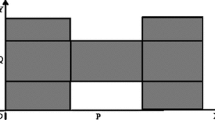Abstract
We construct a kind of linguistic truth-valued intuitionistic fuzzy lattice based on linguistic truth-valued lattice implication algebras to deal with linguistic truth values. We get some properties of implication operators on the set of ∨-irreducible elements. And furthermore the implication operators on the linguistic truth-valued intuitionistic fuzzy lattice are discussed. The proposed system can better express both comparable and incomparable information. Also it can deal with both positive and negative evidences which are represented by linguistic truth values at the same time during the information processing system.



Similar content being viewed by others
References
Atanassov K (1998) Elements of intuitionistic fuzzy logic. Part I. Fuzzy Set Syst 95:39–52
Atanassov KT (2005) Answer to D. Dubois, S. Gottwald, P. Hajek, J. Kacprzyk, H. Prade’s paper “Terminological difficulties in fuzzy set theory: the case of ‘Intuitionistic Fuzzy Sets’”. Fuzzy Sets Syst 156:496–499
Deschrijver G, Kerre EE (2007) On the position of intuitionistic fuzzy set theory in the framework of theories modelling imprecision. Inf Sci 177:1860–1866
Espinilla M, Liu J, Martinez L (2011) An extended hierarchical linguistic model for decision-making problems. Comput Intell 27(3):489–512
Herrera F, Martinez L (2001) The 2-tuple fuzzy linguistic computational model, advantages of its linguistic description, accuracy and consistency. Int J Uncertain Fuzziness Knowl-Based Syst 9:33–48
Herrera F, Lopez E, Mendana C, Rodriguez MA (2001) A linguistic decision model for personnel management solved with a linguistic biojective genetic algorithm. Fuzzy Sets Syst 118:47–64
Herrera F, Alonso S, Chiclana F, Herrera-Viedma E (2009) Computing with words in decision making: foundations, trends and prospects. Fuzzy Optim Decis Making 8(4):337–364
Ho NC (2007) A topological completion of refined hedge algebras and a model of fuzziness of linguistic terms and hedges. Fuzzy Sets Syst 158:436–451
Huynh VN, Ho TB, Nakamori Y (2002) A parametric representation of linguistic hedges in Zadeh’s fuzzy logic. Int J Approx Reason 30:203–223
Liu BD (2004) Uncertainty theory: an introduction to its axiomatic foundations. Springer, Berlin
Liu BD (2010) Uncertainty theory: a branch of mathematics for modeling human uncertainty. Springer, Berlin
Mahapatra GS, Mandal TK, Samanta GP (2011) A production inventory model with fuzzy coefficients using parametric geometric programming approach. Int J Mach Learn Cyber 2(2):99–105
Martinez L, Ruan D, Herrera F (2010) Computing with words in decision support systems: an overview on models and applications. Int J Comput Intell Syst 3(4):382–395
Nguyen CH, Huynh VN (2002) An algebraic approach to linguistic hedges in Zadeh’s fuzzy logic. Fuzzy Set Syst 129:229–254
Pei Z (2007) The algebraic properties of linguistic value “Truth” and its reasoning. Lecture notes in artificial intelligence, vol 4529 (IFSA2007). Springer, Berlin, pp 436–444
Pei Z (2009) Fuzzy risk analysis based on linguistic information fusion. ICIC Exp Lett 3(3):325–330
Pei Z, Ruan D, Liu J, Xu Y (2009) Linguistic values based intelligent information processing: theory, methods, and application. Atlantis computational intelligence systems, vol 1. Atlantis Press/World Scientific, Singapore
Pei Z, Xu Y, Ruan D, Qin K (2009) Extracting complex linguistic data summaries from personnel database via simple linguistic aggregations. Inf Sci 179:2325–2332
Soni H, Shah NH (2011) Optimal policy for fuzzy expected value production inventory model with imprecise production preparation-time. Int J Mach Learn Cyber 2(4):219–224
Turksen IB (2007) Meta-linguistic axioms as a foundation for computing with words. Inf Sci 177:332–359
Wang LJ (2011) An improved multiple fuzzy NNC system based on mutual information and fuzzy integral. Int J Mach Learn Cyber 2(1):25–36
Wang XZ, Dong CR (2009) Improving generalization of fuzzy if-then rules by maximizing fuzzy entropy. IEEE Trans Fuzzy Syst 17(3):556–567
Wang DG, Song WY, Li HX (2008) Unified forms of fuzzy similarity inference method for fuzzy reasoning and fuzzy systems. Int J Innov Comput Inf Control 4(10):2285–2294
Wang XZ, He YL, Dong LC, Zhao HY (2011) Particle swarm optimization for determining fuzzy measures from data. Inf Sci 181(19):4230–4252
Wu J, Wang ST, Fu-lai C (2011) Positive and negative fuzzy rule system, extreme learning machine and image classification. Int J Mach Learn Cyber 2(4):261–271
Xu ZS (2007) Intuitionistic fuzzy aggregation operators. IEEE Trans Fuzzy Syst 15(11):1179–1187
Xu Y, Ruan D, Kerre EE, Liu J (2000) α-Resolution principle based on lattice-valued propositional logic LP(X). Inf Sci 130:195–223
Xu Y, Ruan D, Kerre EE, Liu J (2001) α-Resolution principle based on first-order lattice-valued propositional logic LF(X). Inf Sci 132:195–223
Xu Y, Liu J, Ruan D, Lee TT (2006) On the consistency of rule bases based on lattice-valued first-order logic LF(X). Int J Intell Syst 21:399–424
Xu ZS, Chen J, Wu JJ (2008) Clustering algorithm for intuitionistic fuzzy sets. Inf Sci 178:3775–3790
Zadeh LA (1975) The concept of linguistic variable and its application to approximate reasoning. Parts 1, 2, 3. Inf Sci 8:301–357; 9:43–80 (1975)
Zou L, Ruan D, Pei Z, Xu Y (2008) A linguistic truth-valued reasoning approach in decision making with incomparable information. J Intell Fuzzy Syst 19(4–5):335–343
Zou L, Liu X, Wu Z, Xu Y (2008) A uniform approach of linguistic truth values in sensor evaluation. Int J Fuzzy Optim Decis Making 7(4):387–397
Zou L, Pei Z, Liu X, Xu Y (2009) Semantics of linguistic truth-valued intuitionistic fuzzy proposition calculus. Int J Innov Comput Inf Control 5(12):4745–4752
Zou L, Ruan D, Pei Z, Xu Y (2011) A linguistic-valued lattice implication algebra approach for risk analysis. J Multi-Valued Logic Soft Comput 17:293–303
Acknowledgments
This work is partly supported by national nature science foundation of China (Grant Nos. 61105059, 61175055, 61173100), Liaoning excellent talents in university (LJQ2011116), Sichuan Key Technology Research and Development Program under Grant No. 2011FZ0051, the research fund of Sichuan key laboratory of intelligent network information processing (SGXZD1002-10) and the key laboratory of the radio signals intelligent processing (Xihua university) (XZD0818-09).
Author information
Authors and Affiliations
Corresponding author
Rights and permissions
About this article
Cite this article
Zou, L., Liu, X., Pei, Z. et al. Implication operators on the set of ∨-irreducible element in the linguistic truth-valued intuitionistic fuzzy lattice. Int. J. Mach. Learn. & Cyber. 4, 365–372 (2013). https://doi.org/10.1007/s13042-012-0100-1
Received:
Accepted:
Published:
Issue Date:
DOI: https://doi.org/10.1007/s13042-012-0100-1




